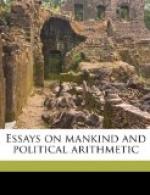We have spoken of the growth of London, with the measures and periods thereof; we come next to the causes and consequences of the same.
The causes of its growth from 1642 to 1682 may be said to have been as follows, viz.:- From 1642 to 1650, that men came out of the country to London, to shelter themselves from the outrages of the Civil Wars during that time; from 1650 to 1660, the royal party came to London for their more private and inexpensive living; from 1660 to 1670, the king’s friends and party came to receive his favours after his happy restoration; from 1670 to 1680, the frequency of plots and parliaments might bring extraordinary numbers to the city; but what reasons to assign for the like increase from 1604 to 1642 I know not, unless I should pick out some remarkable accident happening in each part of the said period, and make that to be the cause of this increase (as vulgar people make the cause of every man’s sickness to be what he did last eat), wherefore, rather than so to say quidlibet de quolibet, I had rather quit even what I have above said to be the cause of London’s increase from 1642 to 1682, and put the whole upon some natural and spontaneous benefits and advantages that men find by living in great more than in small societies, and shall therefore seek for the antecedent causes of this growth in the consequences of the like, considered in greater characters and proportions.
Now, whereas in arithmetic, out of two false positions the truth is extracted, so I hope out of two extravagant contrary suppositions to draw forth some solid and consistent conclusion, viz.:-
The first of the said two suppositions is, that the city of London is seven times bigger than now, and that the inhabitants of it are 4,690,000 people, and that in all the other cities, ports, towns, and villages, there are but 2,710,000 more.
The other supposition is, that the city of London is but a seventh part of its present bigness, and that the inhabitants of it are but 96,000, and that the rest of the inhabitants (being 7,304,000) do cohabit thus: 104,000 of them in small cities and towns, and that the rest, being 7,200,000, do inhabit in houses not contiguous to one another, viz., in 1,200,000 houses, having about twenty-four acres of ground belonging to each of them, accounting about 28,000,000 of acres to be in the whole territory of England, Wales, and the adjacent islands, which any man that pleases may examine upon a good map.
Now, the question is, in which of these two imaginary states would be the most convenient, commodious, and comfortable livings?
But this general question divides itself into the several questions, relating to the following particulars, viz.:-
1. For the defence of the kingdom against foreign powers.
2. For preventing the intestine commotions of parties and factions.
3. For peace and uniformity in religion.




